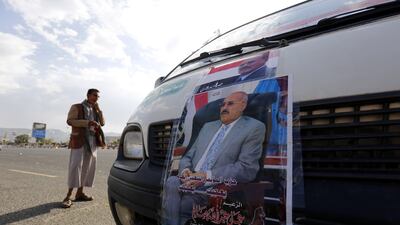A fallout between Yemen's former president and the Houthi rebel leader represents the first chance to break the political deadlock in Yemen, Dr Anwar Gargash, Minister of State for Foreign Affairs, said.
The ousted president Ali Abdullah Saleh entered into an alliance with the Houthis in 2014 when they seized the capital Sanaa from the internationally recognised government and sparked the devastating conflict.
But in recent days cracks have emerged in that alliance with both Mr Saleh and the Houthi leader, Abdul Malek Al Houthi, accusing each other of jeopardising their partnership.
Mr Saleh's comments on Sunday, which attacked the Houthi leader, "was a representation of conflict with the Houthi alliance", said Dr Gargash.
"It represents a chance to break the political deadlock that has been brought by the Houthis," Dr Gargash said on Twitter.
____________
Read more:
Yemen war: Cracks emerge in Houthis-Saleh alliance
____________
Mr Saleh's comments were a response to the Houthi leader's speech a day earlier in which he accused unnamed parties of plotting against the rebels by considering a peace agreement that would go against Yemeni interests.
Both Mr Al Houthi and Mr Saleh mentioned agreeing to a peace solution but only one that would maintain Yemen’s integrity, whom both claim only their political parties can guarantee.
Dr Gargash said the political path remains the solution to the Yemen crisis. "An agreement that unites the Yemeni people and prevents Iranian influence while also remedying the terrorist situation and the future of the South,” he said.
A Saudi-led alliance, which includes the UAE, has been fighting against the Houthi rebels and Mr Saleh's forces since March 2015 in support of the internationally-recognised government of president Abdrabu Mansur Hadi.
“By Yemenis will, a political solution can be reached, the future of a country cannot be built by excluding anyone from the agreement and it cannot be built on a coup,” Dr Gargash said.
Often referred to as a marriage of convenience, both parties formed the alliance to strengthen their forces against the Saudi-led coalition.
In a briefing on Sunday, UN envoy to Yemen Ould Cheikh Ahmed said the intractable two-year conflict was exposing ordinary people to death and hardship.
"Yemen today continues to traverse a critical and agonising period as civilians pay a terrible price of an unending power struggle," Mr Cheikh Ahmed said.
"Those who survive the fighting face death by famine or disease as the economic situation continues to deteriorate … The political tensions in Yemen continue to undermine the state institutions on which many Yemenis depend."
Mr Hadi's government, which is based in Aden, has yet to impose its power over several armed factions there, one of which camped out with its weapons in a protest at a main square on Sunday.
UN-backed peace talks between the warring sides collapsed over a year ago and fighting continues to rage in nationwide battlefronts between militias and army factions loyal to the Houthis and the government.
* additional reporting by Reuters

